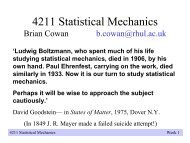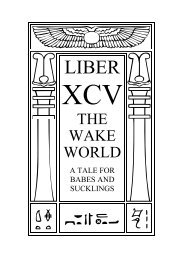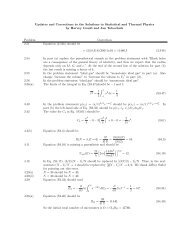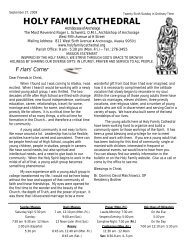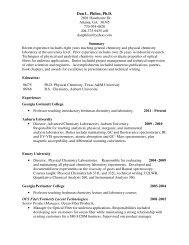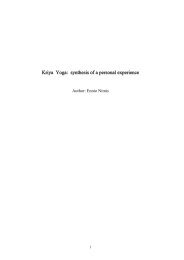A Critique of The German Ideology
A Critique of The German Ideology
A Critique of The German Ideology
You also want an ePaper? Increase the reach of your titles
YUMPU automatically turns print PDFs into web optimized ePapers that Google loves.
the other prescribes for it its conditions <strong>of</strong> life and gives it a definite development, a<br />
special character. It shows that circumstances make men just as much as men make<br />
circumstances.<br />
This sum <strong>of</strong> productive forces, capital funds and social forms <strong>of</strong> intercourse, which every<br />
individual and generation finds in existence as something given, is the real basis <strong>of</strong> what<br />
the philosophers have conceived as "substance" and "essence <strong>of</strong> man", and what they<br />
have deified and attacked; a real basis which is not in the least disturbed, in its effect and<br />
influence on the development <strong>of</strong> men, by the fact that these philosophers revolt against it<br />
as "self-consciousness" and the "Unique". <strong>The</strong>se conditions <strong>of</strong> life, which different<br />
generations find in existence, decide also whether or not the periodically recurring<br />
revolutionary convulsion will be strong enough to overthrow the basis <strong>of</strong> the entire<br />
existing system. And if these material elements <strong>of</strong> a complete revolution are not present<br />
(namely, on the one hand the existing productive forces, on the other the formation <strong>of</strong> a<br />
revolutionary mass, which revolts not only against separate conditions <strong>of</strong> society up till<br />
then, but against the very "production <strong>of</strong> life" till then, the "total activity" on which it was<br />
based), then, as far as practical development is concerned, it is absolutely immaterial<br />
whether the idea <strong>of</strong> this revolution has been expressed a hundred times already, as the<br />
history <strong>of</strong> communism proves.<br />
In the whole conception <strong>of</strong> history up to the present this real basis <strong>of</strong> history has either<br />
been totally neglected or else considered as a minor matter quite irrelevant to the course<br />
<strong>of</strong> history. History must, therefore, always be written according to an extraneous<br />
standard; the real production <strong>of</strong> life seems to be primeval history, while the truly<br />
historical appears to be separated from ordinary life, something extra-superterrestrial.<br />
With this the relation <strong>of</strong> man to nature is excluded from history and hence the antithesis<br />
<strong>of</strong> nature and history is created. <strong>The</strong> exponents <strong>of</strong> this conception <strong>of</strong> history have<br />
consequently only been able to see in history the political actions <strong>of</strong> princes and States,<br />
religious and all sorts <strong>of</strong> theoretical struggles, and in particular in each historical epoch<br />
have had to share the illusion <strong>of</strong> that epoch. For instance, if an epoch imagines itself to be<br />
actuated by purely "political" or "religious" motives, although "religion" and "politics"<br />
are only forms <strong>of</strong> its true motives, the historian accepts this opinion. <strong>The</strong> "idea", the<br />
"conception" <strong>of</strong> the people in question about their real practice, is transformed into the<br />
sole determining, active force, which controls and determines their practice. When the<br />
crude form in which the division <strong>of</strong> labour appears with the Indians and Egyptians calls<br />
forth the caste-system in their State and religion, the historian believes that the<br />
caste-system is the power which has produced this crude social form. While the French<br />
and the English at least hold by the political illusion, which is moderately close to reality,<br />
the <strong>German</strong>s move in the realm <strong>of</strong> the "pure spirit", and make religious illusion the<br />
driving force <strong>of</strong> history. <strong>The</strong> Hegelian philosophy <strong>of</strong> history is the last consequence,<br />
reduced to its "finest expression", <strong>of</strong> all this <strong>German</strong> historiography, for which it is not a<br />
question <strong>of</strong> real, nor even <strong>of</strong> political, interests, but <strong>of</strong> pure thoughts, which consequently<br />
must appear to Saint Bruno as a series <strong>of</strong> "thoughts" that devour one another and are



